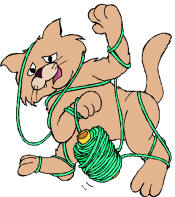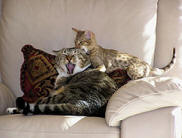Whether
it's puppies, kittens
or children, Nature
insists on play. Play is a requirement
for healthy development of a
loving personality as well as
for a healthy body. In addition,
play is the basis for a social
structure. Individuals of any
species that do not play when
they are young are severely
mentally and socially compromised
when they become adults.
Socializing
should begin no later than three
weeks in kittens, or six weeks
in puppies.
 Pets
who learn to play early, and
play a lot, tend to retain that
playfulness later in life. This
has several benefits to the
pet:
Pets
who learn to play early, and
play a lot, tend to retain that
playfulness later in life. This
has several benefits to the
pet:
- Cardiovascular
development
-
Balance and coordination
-
Joint lubrication
-
Hunting and fighting skills
 Aggressive
Play
Aggressive
Play
 In
cats, because they are not pack
animals, kitten play in the
wild gradually becomes more
aggressive to drive away potential
hunting competitors. This results
in distinct hunting domains,
and is the reason cats are often
referred to as "asocial."
The reason many cats are so
social with people is that they
perceive them as "part
of the family" and therefore
fully accepted and loved. This
can be undone by aggressive
"slap" boxing by
people playing with cats.
In
cats, because they are not pack
animals, kitten play in the
wild gradually becomes more
aggressive to drive away potential
hunting competitors. This results
in distinct hunting domains,
and is the reason cats are often
referred to as "asocial."
The reason many cats are so
social with people is that they
perceive them as "part
of the family" and therefore
fully accepted and loved. This
can be undone by aggressive
"slap" boxing by
people playing with cats.
|
Aggressive
play allows the
cat to show aggressive symptoms
toward humans, and enjoy
doing it! Aggressive
play in kittens may also lead
to aggression in adults. |
Multiple
Functions of Play:

-
Exercise (Cardiovascular)
-
Neurological coordination
-
Hunt skills
-
Fight skills
- Flight
skill
-
Social development
 Pets
who learn to play early,
and play lots, tend to retain
that playfulness later in
life. This has several benefits
to the cat.
Pets
who learn to play early,
and play lots, tend to retain
that playfulness later in
life. This has several benefits
to the cat.
-
More fun in life
-
Owner usually enjoys watching,
so pet is more entertaining
(increases bond)
-
Owner often has more personal
satisfaction (vicarious fun)
-
Easier and more fun for the
owner to exercise the cat
(throw a ball or drag a string)
|
Pets
that don't have sufficient
opportunities to play when young,
are more likely to develop behavior
problems later in life. |
CAT
PLAY (Studies from the wild.)
-
Play begins at six weeks as
play fighting
-
At five months, fighting becomes
more aggressive
-
Leads to territorialism
- Leads
to the reputation for cats
as being
independent